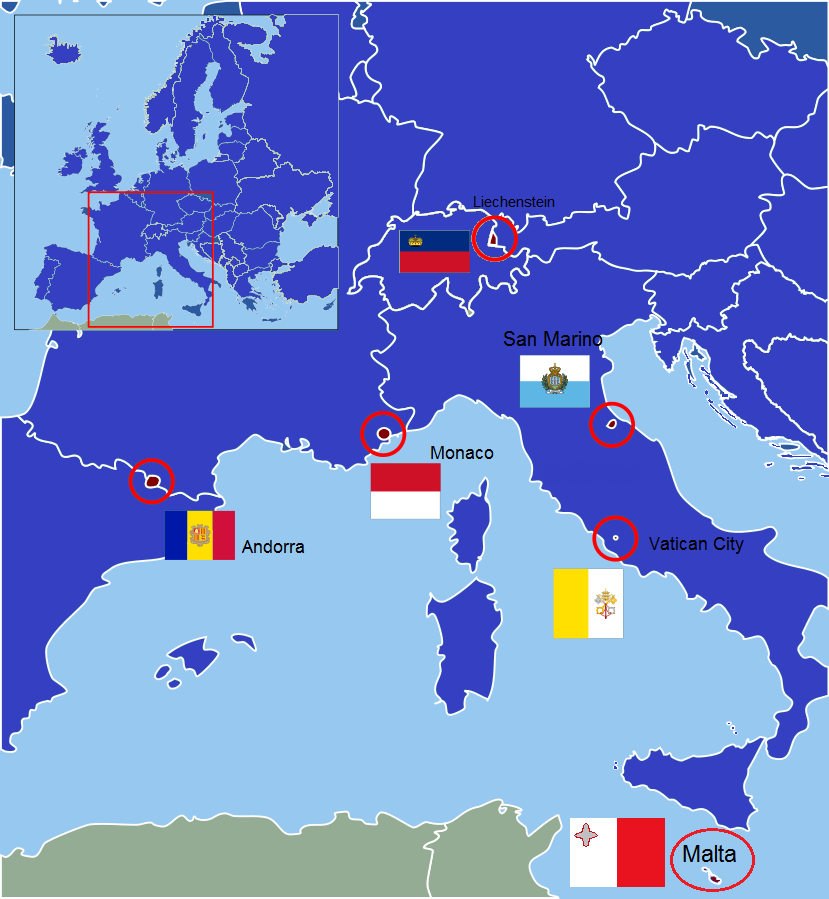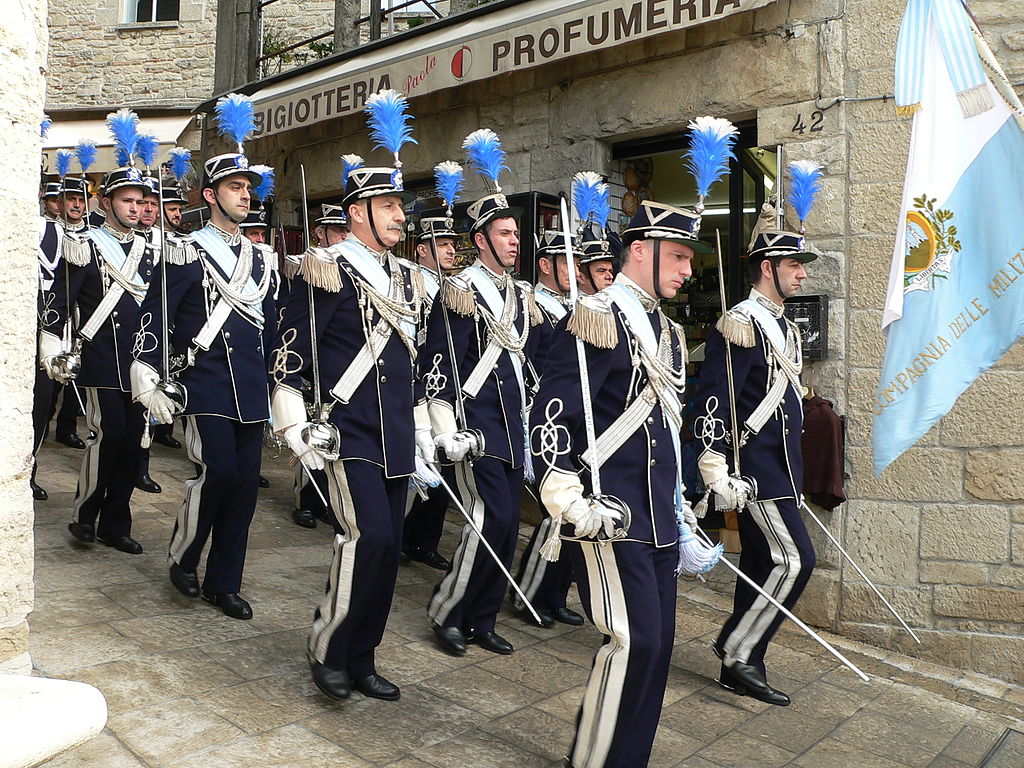The so-called Micro-States or Mini-states are sovereign states with a very small population or territory (or both). In spite of this, these countries exert a wide influence in the United Nations General Assembly, since the structure of the Assembly establishes that each State has one vote. In addition, it should be noted that microstates are also known for issuing and receiving governmental and institutional travelers. Countries such as Monaco, the Vatican or Singapore, maintain extensive international relations with a large number of countries, which promotes the increase of this type of travel to their territory, as well as of their own leaders to other countries.
The most important microstates worldwide are located on the European continent. However, scattered throughout the rest of the world, there are also different microstates of great importance in the international relations panorama.

Great European Micro-States
The best example of a Microstate is the smallest of them in surface; the Vatican City. Despite its small population (618 people in 2018) and its scarce 0.44 km of territory, its theocratic government as an absolute monarchy is one of the most influential in the world, even though not being a United Nations member, but a permanent observer of the General Assembly of the United Nations. All this means that both the international relations of the Vatican City and the GITT trips of its head of state, the Pope, are quite common.
In addition, Vatican City is home to the highest institution of the Catholic Church: the Holy See. It is the latter that maintains diplomatic relations with the other countries of the world, with the Pope as Head of State and highest authority, holding executive, legislative and judicial powers. It is for this reason that, practically every day, the Vatican receives visits of the GITT type; ministerial, Heads of State, etc., thanks to the expansion of the Catholic Church at a global level. Also, given its geographical location (this Microstate is located within the city of Rome, the capital of Italy), governmental and institutional movements to the Vatican City are, therefore, also received by the city of Rome, which is also the logistical host of the delegations.
Meanwhile, the Principality of Monaco is one of the European microstates with the greatest historical significance in terms of foreign relations. In the modern age, the principality was linked to Italy, Spain, France and the Kingdom of Sardinia. Its independence was formally recognized around 1861, although, after the IGM (First World War), it once again became a French protectorate. It is currently governed by a constitutional monarchy, with Prince Albert II of Monaco (Albert Alexandre Louis Pierre Grimaldi) as Head of State.
The Grimaldi, a dynasty that has reigned in the principality for more than seven centuries, maintains close relations with the other royal houses of Europe, as well as with other non-royal heads of state. This means that official or private trips of governmental and institutional personalities to the principality are very frequent and that official receptions, GITT events and meetings between high-ranking officials are repeated with a certain regularity.
With respect to its diplomatic missions, only three countries maintain embassies in the principality: France, Italy and the Sovereign Order of Malta. However, the number of consulates in the country is more than seventy.
Despite this, Monaco actively participates in the United Nations and joined the Council of Europe in 2004. In addition, it is a member of several international organizations such as UNESCO, Interpol or WHO, so the GITT-type trips that both its government and its head of state make are quite constant.
For its part, the Principality of Andorra is governed by a parliamentary co-principality, whereby the head of state is divided between two people who hold office jointly and undivided. This means that the international relations of the Pyrenean country are intensified, especially with Spain and France. This is due, in addition to being geographically located on the border between these two countries, to the fact that the offices are always held by the Bishop of La Seo de Urgel (Spain) and the President of the French Republic. In this way, both assume, from the moment of their respective appointment, the title of co-princes of Andorra, and therefore, the function of highest representation of the Principality with the international community, and especially, with its neighboring countries.
However, Andorra may not have the international importance of the previous examples, but, in spite of this, it has made an important effort to open up over the last 10 years, culminating this process with the first visit of a Spanish head of state to the Pyrenean country in 2021. King Philip VI wished to recognize Andorra's efforts in complying with the improvements in fiscal transparency that the European Union had been demanding of them, and it was considered the prelude to the XXVII Ibero-American Summit of Heads of State and Governments to be held in the Pyrenean micro-State, in April 2021, on a semi-presential basis.
Another principality that is part of the six European microstates is Liechtenstein. This country is strongly linked throughout its history to the Holy Roman-Germanic Empire and, more recently, to Austria and Switzerland, countries between which it is geographically located. The principality is currently governed by a constitutional monarchy, currently headed by Prince John Adam II, Head of State. Regarding the international relations of this principality, it is worth mentioning its membership in the European Economic Area, through the European Free Trade Association and the Schengen Agreement, even though it is not a member of the European Union, which makes it the only Microstate member of this Association.
In addition, both the Prime Minister of the Principality and its Head of State make numerous official trips, since the pillars of its international relations are the maintenance of ties with neighboring countries, cooperation with the European Union and the great commitment taken with multilateral organizations. However, given its status as a micro-State, Liechtenstein has few permanent embassies and representations, and no resident ambassadors from other countries on its territory.

Micro-States outside Europe.
As we mentioned in the introductory part of this article, outside the European continent there are also microstates of great importance on the international scene, such as Singapore. With a total area of 730 km2, it is home to a population of over five and a half million inhabitants and has hosted important events at international level, such as the first meeting between a sitting US president, Donald Trump, and the leader of North Korea, Kim Jong-un, in 2018. In addition, Singapore hosts numerous events related to a large number of different fields and welcomes heads of state from all over the world with some regularity.
This Asian micro-state also maintains bilateral relations with many countries; is a member of the UN (United Nations) since its independence in 1965; and has been a member of the WTO (World Trade Organization) since 1995. Singapore has also become the first associate member of the Pacific Alliance by signing a free trade agreement with this association, composed of Chile, Colombia, Mexico and Peru. All this contributes to both the reception and the issuance of governmental and institutional trips, which strengthen ties between nations and bring closer together positions on issues related to trade, immigration, technology, and a long etcetera.
Other examples of micro-States outside the European continent are the Marshal Islands, the Seychelles or Barbados, States that also have a good presence in governmental events at the international level.
Conclusions
But despite these examples, not all micro-States enjoy the status and success of the above. Some of them, such as Nauru or Tuvalu, which are far away from everything and very limited in their air and maritime communications, maintain levels of tourism and economy that are far from those of their fellow micro-States mentioned above.
Although most of these micro-States enjoy good economic and touristic health, and maintain international relations with a large number of countries. Moreover, they are important players in global geopolitics and actively participate in summits, forums, symposiums, etc., both as guests and hosts. All this confirms, once again, the importance of GITT (Governmental and Institutional Travel and Tourism) for the economy, tourism and the international presence of all countries.



